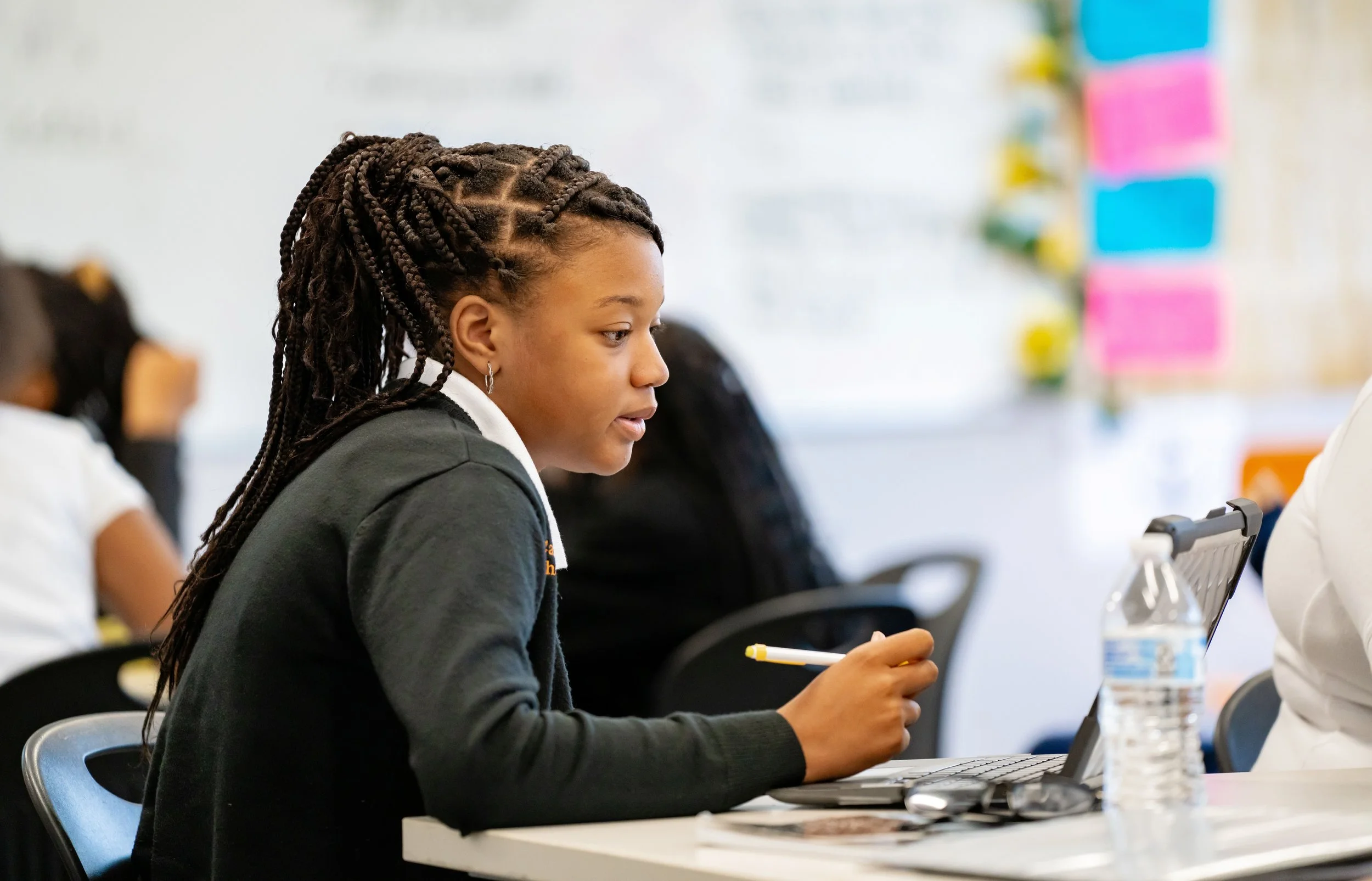CGLA Model
CGLA’s design provides a rigorous academic curriculum and innovative learning opportunities within a supportive environment that nurtures self-confidence, inspires leadership, encourages critical thinking, and promotes academic excellence. The key design elements that help CGLA achieve the margin of excellence are outlined below.
Extended Learning
CGLA extends time for learning, offering a school program with more instructional days (187 at CGLA compared with 180 district-wide) and a longer instructional day. Operating 8:00 a.m. to 4:00 p.m., CGLA provides more than 200 hours of instruction than other Hamilton County schools. In addition, students participate in after school tutoring and special programs.
Small Class Size
CGLA’s low student to teacher ratio (15:1) supports an individualized learning environment and ensures that all teachers know students on a personal level.
STEAM Focus
Research shows girls learn best through inquiry-based learning, and CGLA’s science, technology, engineering, art, and mathematics (STEAM) focus provides a platform for addressing the learning styles of girls and the underrepresentation of women and minorities in STEAM fields. Students take a math and science course every year.
Integrated Remediation
CGLA’s extended learning model and small class size supports an integrated remediation approach intended to move students to proficient and advanced levels within core academic subjects. Tutors work with girls during class and after school to address individual academic needs, and each girl’s academic progress is monitored closely by faculty and the School Leadership Team via weekly team meetings.
Integrated Curriculum
Reading, writing, and the arts are integrated into all subjects (including math and science), and humanities courses are built around overarching essential questions that allow for thematic connections across disciplines.
Technology Integration
CGLA’s design includes providing a laptop to each girl to support learning at school and, ultimately, foster 24/7 learning opportunities. A robust classroom technology program fosters girls’ acquisition of technology skills vital for academic and career success.
Partnerships and Expeditionary Learning
CGLA expands the boundaries of learning beyond the classroom by using the City of Chattanooga as an extended learning and teaching laboratory. Through partnerships with business, civic, and cultural organizations, CGLA girls participate in learning expeditions that are grounded in curriculum and linked to state standards. For example, science students have visited Shuptrine Fine Arts Gallery to study color and light theory and Stone Source to learn about rock types and the engineering process for various stone products. Community partners also serve as supplemental educators and mentors and provide girls with “real world” settings for educational experiences.
Student Leadership Development
To foster self esteem and confidence, student leadership development is threaded throughout the school culture. CGLA’s student-led conferences, a unique approach to the traditional teacher-led conferences, allow students to take the lead in assessing their academic strengths and weaknesses and then collaborate with their family members and teachers to create academic goals. Through the Sister-to-Sister program, high school students mentor middle school students, and CGLA BETA Club members showcase the school to the community by leading tours.
Social Supports
A cornerstone of the CGLA model is its “whole child” approach that combines a rigorous academic program with intensive social supports to meet the needs of girls and their families. The Assistant Principal and Associate Principal are critical to the implementation these support services. Multiple structures and opportunities are available before, during and after school, to provide girls with additional help and guidance (such as counseling services, a mentoring program, tutoring, and academic enrichment).
Health and Wellness
CGLA recognizes the importance of wellness and physical activity in supporting girls’ overall health and academic achievement and integrates physical activity and wellness concepts throughout the curriculum. In addition to the standard physical education coursework, CGLA has competitive volleyball and basketball teams as well as intramural basketball, lacrosse, and soccer teams. The mascot for CGLA is the Mustang!
Unique Assessment System
CGLA’s innovative assessment system is not based on the traditional letter grade system that provides just one chance to “get it right”. The system measures student progress against learning outcomes, ranking performance as “highly proficient,” “proficient,” basic proficiency” or “not yet proficient.” This approach facilitates accountability, provides multiple avenues for girls to demonstrate mastery of learning outcomes, and encourages girls to continuously strive for academic improvement.
Family Engagement
CGLA’s approach to family engagement is one in which parents and other adult caregivers are provided the information, tools, and opportunities to be active partners in the student’s academic achievement and healthy social development. CGLA works closely with families to support their daughters and coordinates several events throughout the year, including an annual orientation for students and families. Families are required to sign a school-family compact, agreeing to contribute at least 16 volunteer hours each year beyond the required orientation and student led conferences.
Professional Learning Community
The school’s professional learning community supports creative instructional methodologies that respond to each girl’s specific learning styles and academic needs. The CGLA schedule builds time into each day for teams and small groups of teachers to exchange information and collaborate, with a focus on student performance data. In addition, professional development sessions are scheduled throughout the year, placing a special emphasis on diagnostic assessments, scaffolding strategies, and analyzing assessment data to inform classroom practices. Each teacher is required to complete at least 120 hours of professional development annually.




 Admissions
Admissions
 Donate
Donate
 Calendar
Calendar